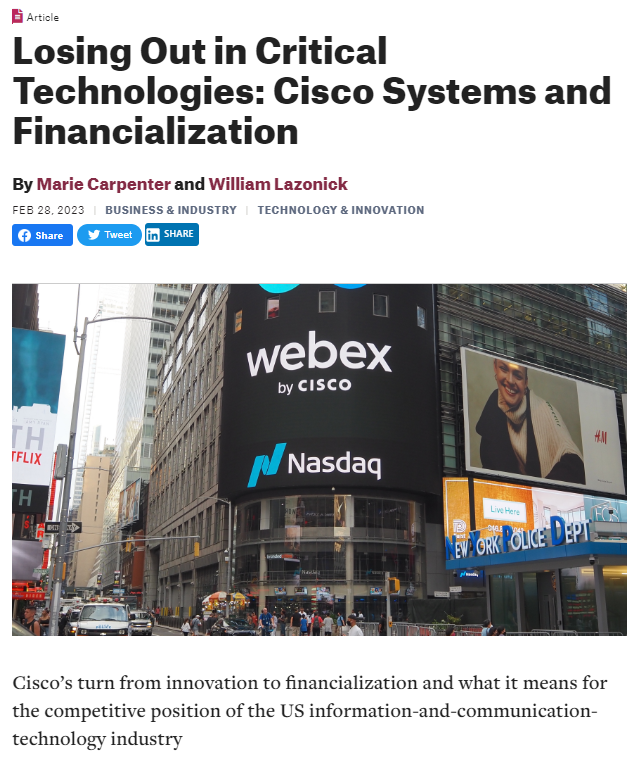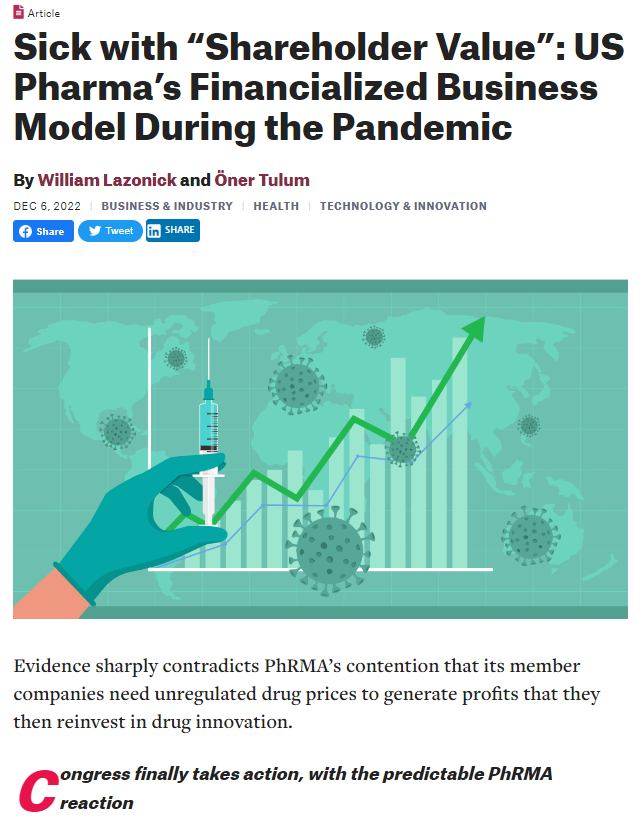By William LAZONICK and Öner TULUM SUMMARY The US healthcare system is under attack. Of course, for more than a decade, Congressional Republicans have been threatening to put an end to Obamacare, but they have never proposed a plan to…
Working papers
The New Economy Business Model and the Tension Between Innovation and Financialization in Research-Intensive Corporations
This working paper investigates the tension between innovation and financialization in the U.S. pharmaceutical industry, focusing on how excessive value extraction undermines medicine development and exacerbates inequalities in access and affordability. By examining the evolving role of the stock market…
AIRnet researchers ask: What Is a “Fair” Drug Price?
This new Institute for New Economic Thinking (INET) blog piece by AIRnet researchers William Lazonick and Öner Tulum explores the complex issue of drug pricing, particularly the ongoing negotiations between Medicare and pharmaceutical companies. In this blog piece based on…
Elon Musk and Tesla Shape America’s Future, but Problems Run Deeper than Tweets
In this insightful INET blog piece, Lynn Parramore interviews AIRnet President William Lazonick about Tesla’s role in shaping America’s future. Drawing on Lazonick and Matt Hopkins’ INET-funded working paper, “Tesla as a Global Competitor: Strategic Control in the EV Transition,”…
Losing Out in Critical Technologies: Cisco Systems and Financialization
by Marie Carpenter and William Lazonick Once the global leader in telecommunication systems and the Internet, over the past two decades the United States has fallen behind global competitors, and in particular China, in mobile- communication infrastructure—specifically 5G and Internet…
Sick with “Shareholder Value”: US Pharma’s Financialized Business Model During the Pandemic
by William Lazonick and Öner Tulum On August 16, 2022, Congress passed the Inflation Reduction Act, which, among other things, enables Medicare to negotiate the prices of certain high-cost prescription drugs, beginning in 2026.[1] Even though it is just one…
Investing in Innovation: Confronting Predatory Value Extraction in the U.S. Corporation
ABSTRACT “Sustainable prosperity” denotes an economy that generates stable and equitable growth for a large and growing middle class. From the 1940s into the 1970s, the United States appeared to be on a trajectory of sustainable prosperity, especially for white-male…
Is the Most Unproductive Firm the Foundation of the Most Efficient Economy?
The neoclassical fallacy gained popularity in the 1950s, during which decade Samuelson revised Economics three times. Meanwhile, Penrose derived the logic of organizational learning that she lays out in TGF from the facts of firm growth, absorbing what was known in the 1950s about the large corporations that had come to dominate the U.S. economy. Also, during that decade, the knowledge base on the growth of firms on which economists could subsequently draw was undergoing an intellectual revolution, led by the business historian, Alfred D. Chandler, Jr. He was engaged in the first stage of a career that would span more than a half century, during which Chandler documented and analyzed the centrality to U.S economic development of what he would come to call “the managerial revolution in American business.”
Innovative Enterprise Solves the Agency Problem: The Theory of the Firm, Financial Flows, and Economic Performance
By William Lazonick ♦ Since the late 1980s, the dominant ideology of corporate governance in the United States has been that, for the sake of superior economic performance, companies should “maximize shareholder value” (MSV). As promulgated by agency theorists, however, MSV is an ideology of value extraction that lacks a theory of value creation. As a theory of value creation, I have constructed “The Theory of Innovative Enterprise”—an analytical framework for understanding how a business enterprise can generate a good or service that is of higher quality and lower cost than products previously available. In this essay, I use innovation theory to provide both a general theoretical critique and a selective empirical critique of agency theory.
US Pharma’s Financialized Business Model
By William Lazonick, Matt Hopkins, Ken Jacobson, Mustafa Erdem Sakinç and Öner Tulum ◊ Price gouging in the US pharmaceutical drug industry goes back more than three decades. In 1985 US Representative Henry Waxman, chair of the House Subcommittee on Health and the Environment, accused the pharmaceutical industry of “gouging the American public” with “outrageous” price increases, driven by “greed on a massive scale.” Even in the wake of the many Congressional inquiries that have taken place since the 1980s, including one inspired by the extortionate prices that Gilead Sciences has placed on its Hepatitis-C drugs Sovaldi since 2013 and Harvoni since 2014, the US government has not seen fit to regulate drug prices. UK Prescription Price Regulation Scheme data for 1996 through 2010 show that, while drug prices in other advanced nations were close to the UK’s regulated prices, those in the United States were between 74 percent and 181 percent higher.










